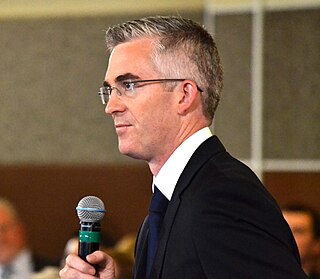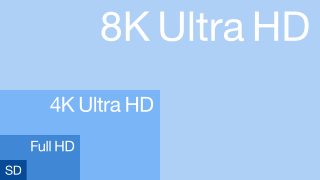Television broadcasts in the United Kingdom began in 1932, however, regular broadcasts would only begin four years later. Television began as a public service which was free of advertising, which followed the first demonstration of a transmitted moving image in 1926. Currently, the United Kingdom has a collection of free-to-air, free-to-view and subscription services over a variety of distribution media, through which there are over 480 channels for consumers as well as on-demand content. There are six main channel owners who are responsible for most material viewed.
Foxtel is an Australian pay television company—operating in cable television, direct broadcast satellite television, and IPTV streaming services. It was formed in April 2018, superseding an earlier company from 1995. The service was established as a 50/50 joint venture between News Corporation and Telstra, with News Corp and Telstra holding 65% and 35% ownership shares respectively.
Prime7, formerly Prime Television and other names, was an Australian television network. Prime Television launched on 17 March 1962 as CBN-8 in Orange, and later expanded to cover regional New South Wales, Victoria and the Australian Capital Territory. It was initially an independent affiliate owned by Prime Media Group before the network, and its sister GWN7, were acquired by Seven West Media on 31 December 2021.
Streaming television is the digital distribution of television content, such as television series and films, as over-the-top media service (OTT). Streaming television stands in contrast to dedicated terrestrial television delivered by over-the-air aerial systems, cable television, and/or satellite television systems.

Mass media in Australia spans traditional and digital formats, and caters mostly to its predominantly English-speaking population. It is delivered in a variety of formats including radio, television, paper, internet and IPTV. Varieties include local, regional, state, federal and international sources of media, reporting on Australian news, opinion, policy, issues and culture.
The Daystar Television Network commonly known as Daystar Television or just Daystar, is an American evangelical Christian-based religious television network owned by the Word of God Fellowship, founded by Marcus Lamb in 1993. Daystar is headquartered in the Dallas/Fort Worth Metroplex in Bedford, Texas. The network is based around prosperity theology.
Community television in Australia is a form of free-to-air non-commercial citizen media in which a television station is owned, operated and/or programmed by a community group to provide local programming to its broadcast area. In principle, community television is another model of facilitating media production and involvement by private citizens and can be likened to public-access television in the United States and community television in Canada.
Freesat is a British free-to-air satellite television service, first formed as a joint venture between the BBC and ITV plc and now owned by Everyone TV. The service was formed as a memorandum in 2007 and has been marketed since 6 May 2008. Freesat offers a satellite alternative to the Freeview service on digital terrestrial television, with a broadly similar selection of channels available without subscription for users purchasing a receiver.
Anti-siphoning laws and regulations are designed to prevent pay television broadcasters from buying monopoly rights to televise important and culturally significant events before free-to-air television has a chance to bid on them. The theory is that if such a monopoly was allowed, then those unable or unwilling to obtain access to the pay television service would be unable to view the important and culturally significant events. Generally the laws allow pay-TV to bid for such monopoly rights only if free-to-air television has declined to bid on them.

Oh! was an Australian cable TV channel owned by Optus Television. It served as the services's premier general entertainment channel until it was replaced by FOX8 in 2002. Programming was mostly sourced from Warner Brothers Television. After the channel's closure, the content was given to Foxtel and XYZnetworks channels, with most of the Warner Brothers shows moving to Arena.

Nine Entertainment is an Australian publicly listed mass media company with holdings in radio and television broadcasting, publishing and digital media. It uses Nine as its corporate branding and also prefers this usage to be used for the parent company.

David Gordon Speers is an Australian journalist and host of Insiders on ABC TV.

The broadcasts of Summer and Winter Olympic Games produced by Seven Sport is televised on the Seven Network in Australia.

Freeview is the brand name of the digital terrestrial television platform in Australia intended to bring all of free-to-air (FTA) broadcasters onto a consistent marketing platform, to compete against subscription television, in particular Foxtel. The strategy coincided with the expansion to 3 digital channels for each FTA network and the planned phasing out of analog television in Australia. Important services from Freeview include its free-to-air channels with an enhanced EPG across all channels. Freeview also certifies televisions, set-top boxes and personal video recorders (PVR) which meet its standards.

SES Platform Services GmbH was a subsidiary company of SES based in Betzdorf, Luxembourg. From its headquarters in Unterföhring near Munich, Germany, SES Platform Services operated a broadcasting centre, providing a wide range of services, including content management, playout, encryption, multiplexing, satellite uplinks and other digital TV media broadcast services for the broadcast industry.

HD+ is a premium high-definition (HD) satellite and streamed TV service for German users, owned by HD PLUS GmbH, a subsidiary of SES based in Unterföhring near Munich, Germany.
Stan is an Australian over-the-top streaming service. It was launched on 26 January 2015. Stan originally was founded as StreamCo Media, a 50/50 joint venture between Nine Entertainment Co. and Fairfax Media. In August 2014, each company invested A$50 million in StreamCo. StreamCo was renamed Stan Entertainment in December 2014, prior to the January 2015 launch of the streaming service. Nine Entertainment would ultimately acquire Fairfax Media in 2018, making Stan a wholly owned subsidiary of Nine Digital.

Ultra-high-definition television today includes 4K UHD and 8K UHD, which are two digital video formats with an aspect ratio of 16:9. These were first proposed by NHK Science & Technology Research Laboratories and later defined and approved by the International Telecommunication Union (ITU).
The Olympic Games have been broadcast on Australian television since 1956, coinciding with both the introduction of television in Australia as well as the first year Australia hosted an Olympics. All three commercial networks have broadcast the Summer Olympics or Winter Olympics at least once, as have both public broadcasters and the dominant subscription television platform Foxtel, often sharing broadcasting rights with another network.









